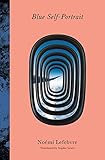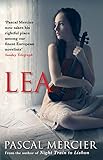Is there art without obsession? Obsession is endemic to the human condition. It drives creation like sunlight nourishes plants. If artists are observers of human follies and failings, then depicting obsession comes with the terrain. Three recently translated novels, ostensibly about music and musicians, use language to illustrate obsession.
 Blue Self-Portrait, by Noémi Lefebvre, translated from French by Sophie Lewis, is narrated by a young woman flying between Berlin and Paris. She sits with her sister, a violinist, and fixates on her love interest, a pianist-composer. Lefebvre transmits the narrator’s obsessive nature through sentences that are pages long with scant punctuation, and cascades of spiraling, stream-of-consciousness thoughts. The pianist-love interest spurs a mental whirligig through German intellectual and cultural history; Nazism; music, art, and language; and sex and relationships, including the narrator’s failed marriage and her overbearing former mother-in-law. All this, in fewer than 150 pages.
Blue Self-Portrait, by Noémi Lefebvre, translated from French by Sophie Lewis, is narrated by a young woman flying between Berlin and Paris. She sits with her sister, a violinist, and fixates on her love interest, a pianist-composer. Lefebvre transmits the narrator’s obsessive nature through sentences that are pages long with scant punctuation, and cascades of spiraling, stream-of-consciousness thoughts. The pianist-love interest spurs a mental whirligig through German intellectual and cultural history; Nazism; music, art, and language; and sex and relationships, including the narrator’s failed marriage and her overbearing former mother-in-law. All this, in fewer than 150 pages.
Blue Self-Portrait is inventive and funny—as well as clever—cycling at breakneck speed through the atrocities of the 20th century while staying connected to the narrator’s primary obsession: the pianist. It may not be a big leap to go from the Wannsee Conference (synonymous with “Final Solution”) to Reinhard Heydrich, who convened Wannsee and was the only senior Nazi official to be assassinated. But segueing from there to the narrator’s pianist love requires a creative twist—
…you can’t play any of that romantic, so-called classical music as if the Heydrichs had not existed, he [the pianist] would say giving his angelic smile before launching into Beethoven, without letting up would explain in his polite and respectful manner to the Auditorium audience which was there to listen to classical music and not to hear a pianist saying that to play Beethoven you must know not only Beethoven but also the Heydrichs…
Lefebvre’s novel is layered with music. It is inspirited with Arnold Schoenberg, the seminal 20th-century Viennese composer and sometime painter, whose self-portrait gives the book its title. With his invention of 12-tone music, Schoenberg broke out of what he perceived to be the shackles of classicism. He used serial patterns (“rows”) derived from the 12 chromatic notes of the scale—think white and black keys on a piano keyboard. A victim of Nazism, Schoenberg was forced to emigrate to the United States in the 1930s, where for nearly two decades he trained a generation of prominent composers.
Blue Self-Portrait’s literary rendering of Schoenberg is one of the many pleasures of this book. The translator notes that Lefebvre probes how we can remember the most shameful ideas of the last century by weaving “her text in approximation of a serialist piece.”
Yet against the 20th century’s sobering background, the narrator affects a seeming detachment. Translator Sophie Lewis concludes this is the narrator’s means to hide an obsessive personality.
Funny that one of the keys to this novel should be not caring. Our heroine is castigated repeatedly, and repeatedly berates herself, for the crime of “désinvolture.” What is this elegant French notion? Why, nonchalance, insouciance, of course. Plain old frivolity, laidbackness, devilmaycareism, happy-go-lucky style; in the plainest English, it’s not caring. But she does care—hence all the obsessing…[t]his term so often reiterated it counts more as a musical leitmotif than a point of prose argument.
This “not-caring” musical leitmotif, combined with sentences of prodigious length and a fixation on history’s ills, are Lefebvre’s tools to convey obsession.
 Swiss writer Pascal Mercier, translated from German by Shaun Whiteside, uses pace and character to achieve similar ends. Lea opens when Adrian Herzog, a physician, meets Martijn van Vliet, director of a laboratory, in a café in Saint Remy. “I didn’t want to hear Martijn van Vliet’s story,” Herzog says, and then proceeds not only to hear it, but also to narrate it as the two men road trip toward Bern.
Swiss writer Pascal Mercier, translated from German by Shaun Whiteside, uses pace and character to achieve similar ends. Lea opens when Adrian Herzog, a physician, meets Martijn van Vliet, director of a laboratory, in a café in Saint Remy. “I didn’t want to hear Martijn van Vliet’s story,” Herzog says, and then proceeds not only to hear it, but also to narrate it as the two men road trip toward Bern.
Lea is Martijn van Vliet’s (now adult) daughter. A frisson of fear and foreboding surrounds her narrative. Mourning her mother’s early passing, Lea became obsessed with learning the violin at age eight—
I can find no better words than these: she picked it up and started to play. Just as if she had been waiting all that time for someone to bring to her, at long last, the instrument for which she was born.
Martijn welcomes the violin as a means to wrest his daughter from grief. Is there a better symbol for obsession than the quest to master such a difficult instrument? With the violin as a starting point, Lea and her widowed father spin into mania’s vortex.
Martijn plays the hapless but well-intentioned father, unable to read Lea accurately or provide the care she desperately needs. In thrall to his daughter’s talent, he makes a series of terrible choices, including how to finance the purchase of Lea’s instrument. He fails to respond appropriately as Lea rotates through teachers and relationships with a destructive intensity that ends very badly. Ultimately, she lands in a mental institution where her doctor forbids Martijn to visit.
As Martijn and Adrian stop along the way to Bern, Adrian’s story unfolds in parallel—his fear that he is getting too old to practice medicine, and his worries about his relationship with his own alienated, adult daughter. Starting as strangers, Martijn and Adrian end up with intimate knowledge of each other’s private and public lives. As the novel moves inexorably toward tragedy, Adrian says—
I felt myself slumping. I didn’t want to hear anything more of this sorry tale. I didn’t have the strength.
It is plot and metaphor, along with Martijn’s growing desperation that transmits obsession in Mercier’s Lea.
 In both content and length, Compass, by Mathias Énard, translated from French by Charlotte Mandell, is the weightiest of these three books. A novel of great complexity, Compass won France’s Prix Goncourt. Musicologist Franz Ritter narrates Compass from his sickbed in Vienna as if he were in an opium haze (perhaps he is)—
In both content and length, Compass, by Mathias Énard, translated from French by Charlotte Mandell, is the weightiest of these three books. A novel of great complexity, Compass won France’s Prix Goncourt. Musicologist Franz Ritter narrates Compass from his sickbed in Vienna as if he were in an opium haze (perhaps he is)—
We are two opium smokers each in his own cloud, seeing nothing outside, alone, never understanding each other we smoke, faces agonizing in a mirror, we are a frozen image to which time gives the illusion of movement, a snow crystal gliding over a ball of frost, the complexity of whose intertwinings no one can see, I am that drop of water condensed on the window of my living room, a rolling liquid pearl that knows nothing of the vapor that engendered it…
That sumptuous sentence opens the novel and runs to hundreds of words. Facing a fatal illness, Ritter reviews his life and oeuvre in close to 450 pages that are part travelogue, part intellectual history, and part complex philosophical musings. Threading through the book is a long sigh of remembrance for Sarah, a French scholar. Sarah is a distant and unrequited love who symbolizes all that is lost, all that is no longer attainable, and all that likely never was attainable. In other words, she is Ritter’s obsession.
“Dear Sarah, you should know that I am dying.” A little too anodyne. “Dear Sarah, I miss you,” too direct. “Dearest Sarah, could old sufferings one day become joys?” That’s good, old sufferings. Had I cribbed from the poets, in my letters from Istanbul? I hope she hasn’t kept them—a monument to boastfulness.
Ritter’s profession of musicologist is apt, since music by its nature is ephemeral, but also composed of time and experienced within time.
Life is a Mahler symphony, it never goes back, never retraces its steps. This feeling of the passing of time is the definition of melancholy, an awareness of finitude from which there is no refuge, aside from opium and oblivion…
Compass is a literal compass, traveling the world like a 21st-century Marco Polo. The musicologist’s inquiries spring from his experiences across Turkey, Syria, and Iran in his study of Orientalism and the European musical tradition. He probes language and ancient history, plumbing a gigantic range of topics from Mongols to Mozart, Beethoven to Bedouins—
Karol Szymanowski [early 20th-century composer] to her was a part of the Polish soul, and meant nothing Oriental; she preferred the Mazurkas to the Muezzin, the dances of the Tatra Mountains to those of the Atlas.
It is gratifying to give in to the great sweep of this novel, to be immersed in Ritter’s adventures, and in his capacious imaginings. Here’s Franz, moving from Wagner to fundamentalism to Nietzsche.
The important thing is not to lose east…Why am I so wound up against Wagner tonight? Maybe it’s the influence of Beethoven’s compass, the one that points east. Wagner is the zahir, the apparent, the sinister dry West…Wagner closes everything. Destroys opera. Drowns it. The total artwork becomes totalitarian. What is there in his almond? Everything…Wagner is the Islamic Republic. Despite his interest in Buddhism, despite his passion for Schopenhauer, Wagner transforms everything into that Christian alterity in self…Nietzsche is the only one who was able to distance himself from that magnet.
By its very length and heft, this book cries obsession. As in Blue Self-Portrait, the reader is privy to the narrator’s proliferating musings. Knocking on death’s door, Franz Ritter circles the earth. He interrogates his life’s work—music—and paints a picture of longing and depth that make him not only sympathetic, but also lovable.
In this trio of novels, music mirrors and underscores obsession. Is it notable that two of the writers are French and one Swiss? Certainly the cultural references—sophisticated to obtuse—that saturate these books are not generally the stuff of American novels. Obsession, however, is universal.
Image Credit: Unsplash/Pawel Czerwinski.







